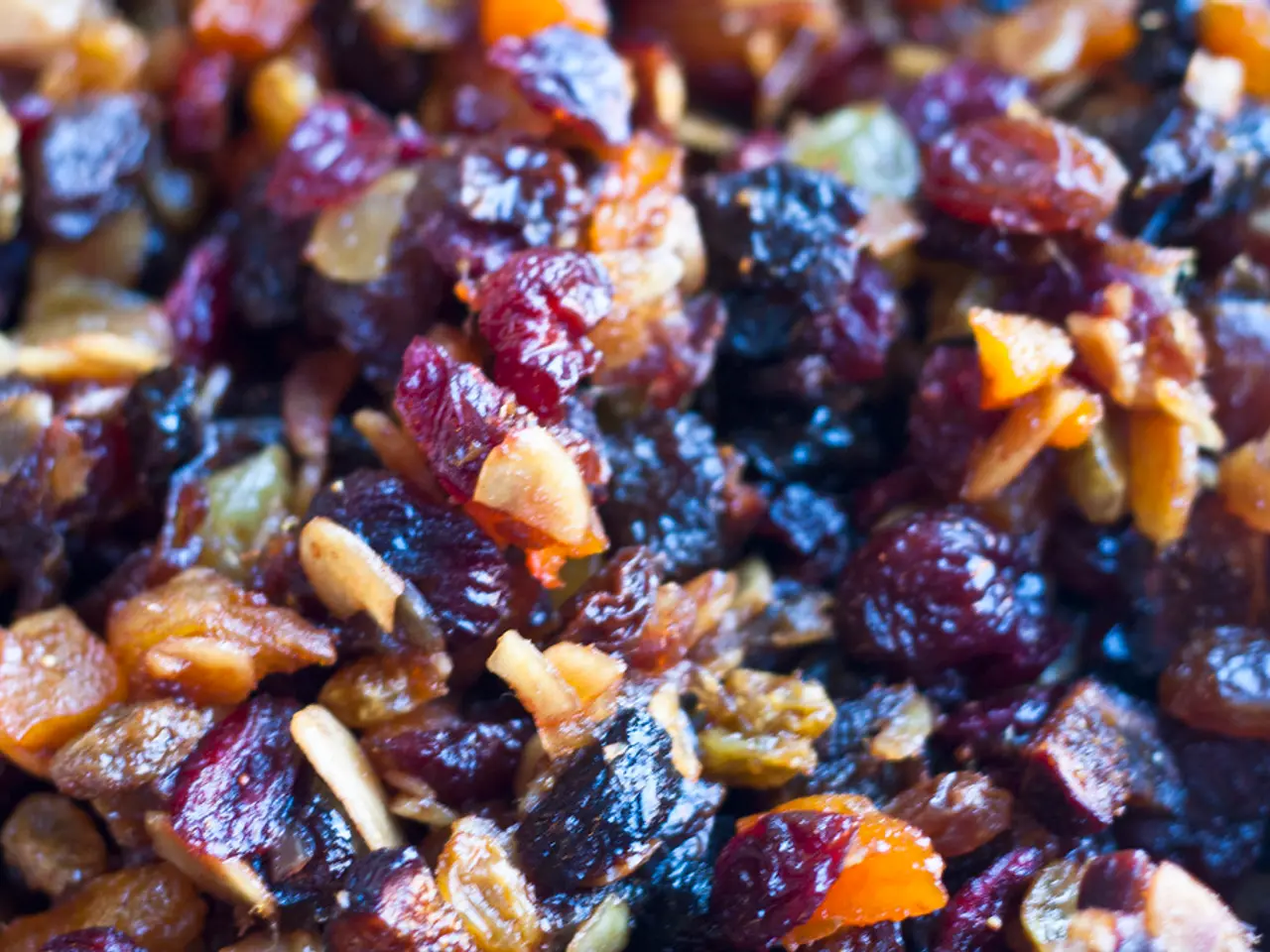Diet for Macular Degeneration: Nutritious Foods and Their Advantages
The condition known as macular degeneration, which affects the macula - the part of the eye responsible for central vision - currently has no cure. However, certain treatments can help slow down vision loss [1]. One such approach is adopting a diet rich in vegetables, fruits, whole grains, legumes, fish, and olive oil, as recommended by research and the Mediterranean diet.
This diet naturally provides protective nutrients such as lutein, zeaxanthin, omega-3 fatty acids, fiber, and antioxidants, which combat oxidative stress and inflammation, key factors in AMD progression [1][2][3]. Specifically, leafy green vegetables, colorful fruits and vegetables, fatty fish, nuts and seeds, and extra virgin olive oil are recommended.
Leafy green vegetables, such as spinach and kale, are rich in lutein and zeaxanthin, which filter harmful blue light and protect the retina. Colorful fruits and vegetables, like carrots, sweet potatoes, and bell peppers, are rich in vitamin A, essential for vision. Fatty fish, such as salmon, mackerel, and sardines, are high in omega-3 fatty acids and vitamin D, which are anti-inflammatory and linked to lower AMD risk. Nuts and seeds, like walnuts and flaxseeds, provide additional omega-3 fatty acids. Extra virgin olive oil serves as a healthy fat source.
In addition, supplements based on the AREDS2 formula are scientifically supported to slow progression in some people with AMD. The AREDS2 combination includes vitamin C, vitamin E, zinc, copper, lutein, zeaxanthin, and beta-carotene, which has been replaced with lutein and zeaxanthin due to better efficacy and safety [1][5].
Adapting a Mediterranean-style diet with these key nutrients and using AREDS2-based supplements where appropriate offers a comprehensive strategy to reduce the risk of progression and support eye health in macular degeneration [1][2][3].
It is important to note that while the Mediterranean diet and supplements can be beneficial, it is crucial to consult a doctor before starting any new supplement regimen.
References:
[1] National Eye Institute. (2021). Age-Related Macular Degeneration. Retrieved from https://nei.nih.gov/health/maculardegen/armd
[2] American Academy of Ophthalmology. (2021). Age-Related Macular Degeneration. Retrieved from https://www.aao.org/eye-health/diseases/age-related-macular-degeneration-amd
[3] National Health Service (UK). (2021). Age-related macular degeneration. Retrieved from https://www.nhs.uk/conditions/age-related-macular-degeneration/
[4] AREDS2 Research Group. (2013). A Randomized Trial of the Effect of Lutein + Zeaxanthin Supplementation on Age-Related Macular Degeneration Progression: The Age-Related Eye Disease Study 2 (AREDS2) Report No. 18. Ophthalmology, 120(12), 2227-2234. doi: 10.1016/j.ophtha.2013.05.018
[5] Age-Related Eye Disease Study 2 (AREDS2) Research Group. (2013). A randomized clinical trial of the effects of lutein + zeaxanthin supplementation on age-related macular degeneration progression in persons with intermediate-stage age-related macular degeneration: the Age-Related Eye Disease Study 2 (AREDS2) report no. 7. Archives of Ophthalmology, 131(12), 1604-1610. doi: 10.1001/jama.2013.283074
- Macular degeneration, a disease affecting the macula, has no cure but certain treatments can help slow down degeneration.
- One treatment approach involves adopting a diet rich in vegetables, fruits, whole grains, legumes, fish, and olive oil, as recommended by research and the Mediterranean diet.
- Lutein and zeaxanthin, found in leafy green vegetables, protect the retina by filtering harmful blue light and combating oxidative stress and inflammation.
- Colorful fruits and vegetables provide vitamin A, essential for vision, while fatty fish like salmon, mackerel, and sardines are high in anti-inflammatory omega-3 fatty acids and vitamin D, lowering AMD risk.
- Nuts and seeds, such as walnuts and flaxseeds, provide additional omega-3 fatty acids, and extra virgin olive oil serves as a healthy fat source.
- Supplements based on the AREDS2 formula, which includes lutein, zeaxanthin, vitamins C and E, zinc, copper, and beta-carotene (replaced with lutein and zeaxanthin for better efficacy and safety), are scientifically supported to slow progression in some people with AMD.
- Consulting a doctor before starting any new supplement regimen for AMD is crucial, as adapting a Mediterranean-style diet with these key nutrients and using AREDS2-based supplements where appropriate can offer a comprehensive strategy to support eye health and reduce the risk of progression.




